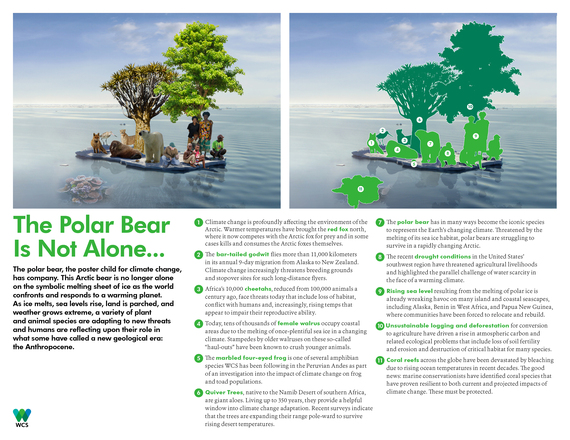It can't be business as usual anymore if we are to protect all life from the human-caused effects of a warming planet.
There's a feeling of hope, and rightly so, coming out of Paris this past weekend: The climate accord, signed by 195 countries, shows a commitment by the global community to reduce the greenhouse gases warming our planet. The world's governments are for the first time agreeing to commit themselves to taking concerted action to curtail the causes and impacts of climate change.

WCS marine conservationists and their partners are identifying coral species resilient to current and projected impacts of climate change that must be protected. Photo by Tim McClanahan ©WCS.
This 21st gathering of the Conference of the Parties of the United Nations Framework Convention on Climate Change marks a point where policy is catching up with the science. It can't be business as usual anymore if we are to protect all life from the human-caused effects of a warming planet.
The accord should be praised for recognizing the urgent need to take significant actions reducing the use of fossil-fuels and the need to reduce emissions of CO2 caused by deforestation. Tropical deforestation represents around 15 percent of global emissions, more than all the cars, trucks, and airplanes in the world combined. Further, intact forests protect wildlife habitat and absorb carbon dioxide through continued growth, partially counteracting emissions from other sources.
On the issue of deforestation, WCS is pleased to see in the accord language specifically encouraging the protection of our planet's last intact forests. The accord emphasizes the need for 'policy approaches and positive incentives for activities relating to reducing emissions from deforestation.'

In Madagascar and across the globe, WCS works with local communities to address deforestation and help both wildlife and people adapt to the impacts of climate change. Photo by Julie Larsen Maher ©WCS.
Our hope is that technological solutions and long-term behavior change will create the framework for a sustainable future by matching reductions in deforestation with the finances that are needed to pay for the nuts and bolts of conservation. Protecting our large intact forests also provides habitat for a vast array of species, many of which will need to adjust ranges and find new resources to help them adapt to the impacts of climate change.
At WCS, we work with local communities across the globe that depend on ecosystems; we are working with them to address issues of deforestation and we are helping both wildlife and people adapt to the impacts of climate change by ensuring the protection of functioning ecosystems and the services they provide that support all life on our planet.
Paris is not the last word nor the last global commitment that will be necessary to truly address climate change, but it is a vital step along the way. We all need to take further action to promote clean energy, wean our economies off fossil fuels, curtail deforestation, and focus even more on applied solutions to both the current and future impacts of a warming planet.
Follow Cristián on Twitter at: @CristianSamper

